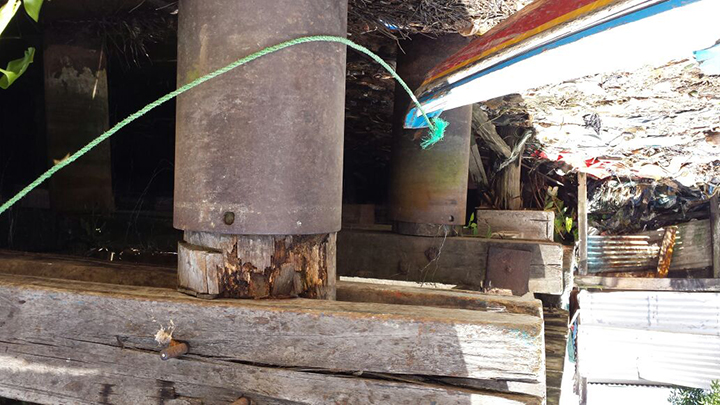Despite a recommendation that vendors be removed from the Charity Marketing Centre, which is on the verge of collapse into the Pomeroon River, many are continuing to sell at the site as they say they have not yet been notified by the Charity/ Urasara Neighbourhood Democratic Council (NDC).
As a result, vendors believe that someone from the NDC should have an urgent consultation with them to determine where they will be relocated.
After Stabroek News highlighted the risk vendors face by continuing to sell at the 38-year-old facility in August of last year, this publication was told that urgent attention would be paid to the issue. However, nothing has been done.

This matter was reported on by Regional Vice-Chairman Juliet Coonjah at the last Regional Democratic Council (RDC) statutory meeting.
According to Coonjah, an assessment of the wharf adjoining the centre was recently conducted by an engineer from the Ministry of Public Infrastructure, who found that most of the piles beneath the structure have deteriorated to such a state that they no longer support the solid concrete structure. The few remaining piles are very feeble and are likely to soon give out.
Stabroek News had observed that nearly all of the wooden piles that were supporting the concrete structure were significantly rotted, with some sinking as a result.
In an invited comment, Coonjah said that the notices to vacate the structure need to be served to the vendors by the NDC.
“The recommendation of the works committee is that the vendors should be removed immediately. The engineer went below and he had a very good view of it and it is very dangerous. I haven’t made any contact with the NDC or the REO [Regional Executive Officer] to verify if the notices have been served… The NDC deals directly with the vendors and they would need to decide where the vendors will be relocated to. They should call the people in and have a discussion and give them an alternate as to where they will be placed,” Coonjah said.
One vendor, who asked not to be named, shared his frustration when he spoke to this publication.
“First off, I know that the structure is bad and any day it might collapse but we, as vendors, just can’t stop selling here. We are taking a risk by coming here every day and opening our stalls but apparently that does not concern the NDC because if it did, they would have already come to talk to us. If we just close up shop and stay at home, how will we get money? We have families to provide for. We have children to send to school. What I would like to know is where they will put us to sell if they say we have to move and what will they do with all our materials that we used to build our stalls? These are questions that need answers but nobody is coming to tell us anything. There is the tarmac at the back street that they said was for the roadside vendors but business don’t go on there. At the back there is very slow and I am not a roadside vendor, so if they ask me to relocate there, I will not go,” the man explained.
The NDC made a decision in July of last year to prohibit trucks from being loaded on the wharf until repairs.
The newly-elected Chairman of the Charity/Urasara NDC Deoranie Persaud was only sworn in on Thursday last and had no clear idea about the situation but when asked about the serving of the notices of evacuation, Overseer of the Charity NDC Samuel Sooklall said that his office was not informed about the notices that were to be served to vendors.
“The council is not aware of any notices that were to be served but in any case, the vendors would need to move if the structure needs to be repaired. But, again, no one… inform[ed] the council of the notices and I want to say that the RDC cannot bypass the NDC when the NDC is in charge of the vendors,” Sooklall explained.
Vendors are hoping that an urgent consultation can be held with them and that they will be relocated to a suitable area to ensure that their livelihoods are maintained.






